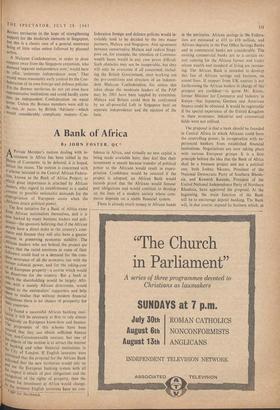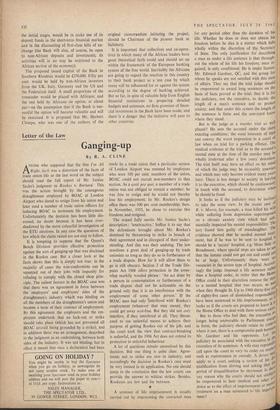A Bank of Africa
By JOHN FOSTER, QC* APrivate Member's motion dealing with in- vestment in Africa has been tabled in the House of Commons; to be debated, it is hoped, before the recess. The motion is concerned with a scheme initiated in the Central African Federa- 1 tion, known as the Bank of Africa Project; to which great importance is attached by African leaders, who regard its establishment as a useful counter to possible nationalist demands for the expropriation of European assets when the Africans attain political power. The first initiative for a Bank of Africa came from African nationalists themselves, and it is now backed by many business leaders and poli- ticians—the sponsors believing that if the African People have a direct stake in the country's com- merce and finance they will also have a greater interest in preserving economic stability. The African leaders who are behind the project are aware that the racial emotions in some of their followers could lead to a demand for the com- plete severance of all the economic ties with the former colonial power, and for the taking-over of all European property--a course which would 'e disastrous for the country. But a bank in which the shareholding would be largely Afri- Can• with a mainly African directorate, would appeal to the nationalists' supporters and help them to realise that without modern financial institutions there is no chance of prosperity for their countries.
t 1:0 found a successful African banking insti- lit1°11 it will be necessary at first to rely almost Tkilusiyely on European know-how and finance. a e proponents of this scheme have been kl Essored that they can obtain sufficient finance e th°111 non-Commonwealth sources; but one of °„ biects of the motion is to attract the interest the banking and other financial institutions in rG h e City of London. If English investors were nyinced that the proposal for the African Bank Indicated that the new territories would rely on alI d use the European banking system with all reh e respect it entails of past obligations and the eltignition of the rights of property, then the A,, mate for investment in Africa would change. the moment English investors have no con- ` MP fori■i fidence in Africa, and virtually no new capital is being made available here; they feel that their investment is unsafe because transfer of political power to the Africans would result in expro- priation. Confidence would be restored if the project is adopted; an African Bank would furnish proof that the Africans would honour past obligations and would continue to develop on the lines of a modern society where com- merce depends on a stable financial system.
There is already much money in African hands in the territories. African savings in the Federa- tion are estimated at £15 to £18 million, and African deposits in the Post Office Savings Banks and in commercial banks are considerable. The existing commercial banks are to a certain ex- tent catering for the African farmer and trader whose wealth and standard of living are increas- ing. The African Bank is intended to develop this line of African savings and business, on sound lines. If support from UK sources is not forthcoming the African leaders in charge of this prospect are confident—to quote Mr. Kiano, former Minister for Commerce and Industry in Kenya--that Japanese, German and American finance could be obtained. It would be regrettable if the special experience of the United Kingdom in these economic. industrial and commercial fields were not utilised.
The proposal is that a bank should be founded in Central Africa in which Africans could have the controlling power, in co-operation with ex- perienced bankers from established financial institutions. Negotiations are now taking place with various European groups. It is a firm principle behind the idea that the Bank of Africa shall be a business project and not a political one; both Joshua Nkomo, President of the National Democratic Party of Southern Rhode- sia, and Kenneth Kaunda, President of the United National Independence Party of Northern Rhodesia, have approved the proposal. At the beginning, the main function of the Bank will be to encourage deposit banking. The Bank will, in due course, expand its business which, at the initial stages, would be to make use of its deposit funds in the short-term financial market and in the discounting of first-class bills of ex- change (the Bank will also, of course, be open to non-African deposits and investments; its activities will in no way be restricted to the African section of the economy).
The proposed issued capital of the Bank in Southern Rhodesia would be £250,000. Fifty per cent. would be held by non-African investors from the UK, Italy, Germany and the US and the Federation itself. A small proportion of the remainder would be placed with Africans; and the rest held by Africans on option, at about par—on the assumption that if the Bank is suc- cessful the option will become valuable and will be exercised. It is proposed that Mr. Herbert Chitepo, who was one of the authors of the original memorandum initiating the project, should be Chairman of the pioneer bank in Salisbury.
It is important that collectives and co-opera- tives in which many of the African leaders have great theoretical faith could and should set up within the framework of the European banking system of the free world. Inevitably the Africans are going to regard the reaction in this country to their bank project as a test case by which many will be influenced for or against the system according to the degree of backing achieved. But so far, in spite of valuable help from English financial institutions in preparing detailed budgets and estimates, no firm promises of finan- cial investment in the ,Bank have been made; and there is a danger that the initiative will pass to other countries.



































 Previous page
Previous page